What if I told you that a simple course could revolutionize the way healthcare is managed? Meet the groundbreaking management courses that are reshaping the industry, offering insights even seasoned professionals swear by.
In today's rapidly evolving healthcare landscape, these courses aren’t just useful—they’re essential. With unprecedented challenges, staying updated with cutting-edge management skills has never been more critical. Are you ready to discover them?
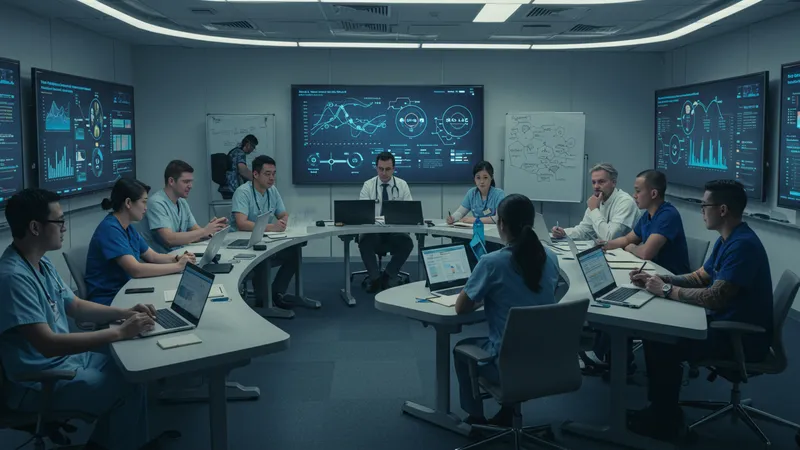
The world of healthcare management is not what it used to be. Did you know that only 30% of healthcare professionals feel adequately trained in management? That's a shocking statistic considering the importance of effective leadership in healthcare settings. Without proper training, even the most experienced healthcare specialists can miss crucial management cues that affect patient outcomes. But that’s not even the wildest part…
Moreover, these courses delve into fascinating realms that most practitioners never consider—like the psychological nuances of team dynamics and innovative decision-making processes. Imagine a healthcare system where every decision is backed not just by science, but by strategic management thinking. It sounds futuristic, but it's happening today. Often, the backlash to integrating these courses stems from unexpected areas. But just wait until you hear where the resistance is coming from...
What happens next shocked even the experts—a trend so transformative that it could change the face of healthcare forever. Stick with us as we unravel the hidden corners of this educational revolution.
Believe it or not, demand for healthcare management courses has surged by almost 200% in the past five years. This growth is fueled not only by the pandemic-induced challenges but also by an industry-wide push for innovation. Workers who once focused solely on clinical tasks are now finding themselves navigating complex hospital logistics. Training becomes indispensable when the balance between patient care and organizational management hangs in the balance. Yet, there’s one hidden reason behind this demand that’s raising eyebrows across the board.
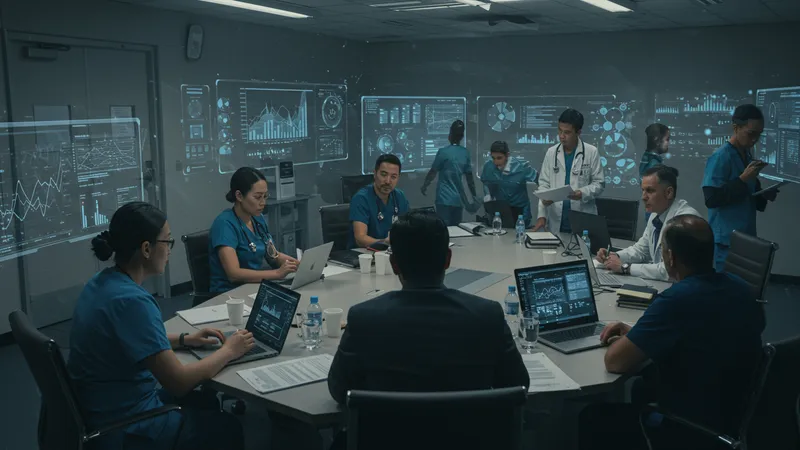
Interestingly, a significant driver of this surge comes from unexpected quarters—non-medical staff seeking to move into healthcare management roles. This influx brings fresh perspectives but also leads to intriguing clashes with traditional healthcare paradigms. Imagine administrators who were once outsiders now spearheading key operational strategies. This twist in roles forces a rethink of what constitutes a competent healthcare manager. It could spell disaster if not managed correctly, but that’s not the end of the story.
As these dynamics evolve, institutions are re-evaluating their training strategies, investing in courses that blend innovation with foundational knowledge. There's a distinct focus on adapting curricula to meet these new workforce needs, ensuring that everyone from surgeons to secretaries is equipped with the leadership skills necessary to succeed. And here's the kicker: the impact is not just organizational. Employee satisfaction is reportedly on the rise as management issues are addressed more effectively. But what’s truly surprising is the ripple effect these improvements are having.
So, how does this impact patient care? Experts reveal that well-trained management leads to shorter hospital stays, enhanced patient experience, and improved treatment outcomes. This holistic transformation speaks volumes about the power of education in healthcare management. Hold on, because the story doesn’t end here—there’s an unexpected chapter waiting to unfold that could redefine how we approach training in this field forever.
In a world increasingly preferring remote solutions, online learning platforms have emerged as game-changers for healthcare management training. With the flexibility to learn at one's own pace, these platforms are bridging the accessibility gap, offering unparalleled opportunities for upskilling. Institutions like Coursera and edX have capitalized on this trend, expanding their course offerings to cater to a diverse audience. The implications of this shift towards digital education are profound, highlighting an untapped reservoir of potential waiting to be harnessed. But there’s a twist that even digital enthusiasts didn’t anticipate.
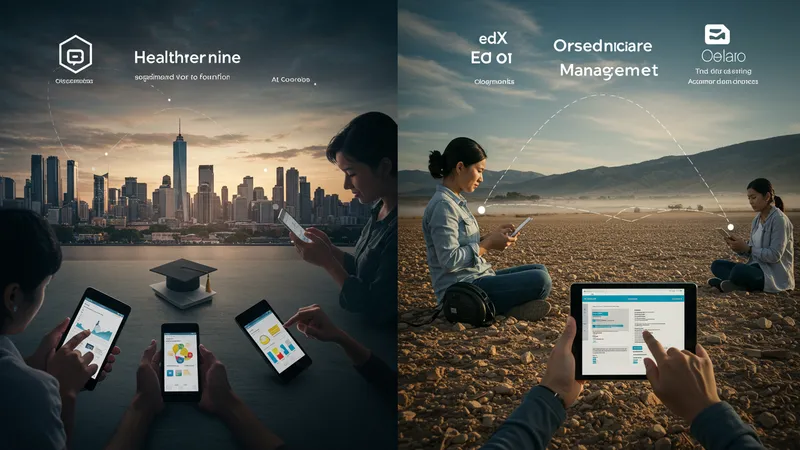
The varying levels of global internet connectivity posed a significant challenge initially, with educators scrambling to ensure inclusive access to these courses. However, innovations in technology and widespread adoption of smartphones have started to bridge this gap. It's a transformation that many experts never saw coming, aiding in bringing education to remote and underserved locations. Yet, there’s one statistic that turns this narrative on its head: did you know that despite expected obstacles, completion rates for online courses are outpacing conventional classroom setups?
What sets online platforms apart is their ability to constantly update and customize course content. Imagine real-time case studies arriving with the latest medical trends and technologies, preparing professionals to lead with confidence and foresight. The self-paced nature allows students to deeply absorb material, reflecting on it and applying it as needed. This learning model not only suits the busy schedules of healthcare professionals but also ensures comprehensive understanding. However, there’s one overlooked aspect of this approach that few recognize—until now.
As we explore deeper, we uncover a controversial debate: the effectiveness of online learning versus traditional education. As digital courses outshine in certain metrics, many institutions face a dilemma. Should decades-old methodologies make way for these radical new practices? What educators and administrators decide next could forever influence the trajectory of healthcare management training. Stay tuned as we delve further into these complex decisions and their surprising outcomes.
While new management courses are making waves, gaining acceptance in traditional large-scale hospitals remains an uphill battle. The reluctance stems from entrenched cultures that prioritize hierarchical and time-tested methods over contemporary educational reforms. This tension reveals a deeper complexity in the healthcare education arena, calling into question long-held assumptions about best practices versus innovation-driven strategies. The resistance isn't about the content but who controls it, leading to power struggles that are reshaping the managerial landscape.
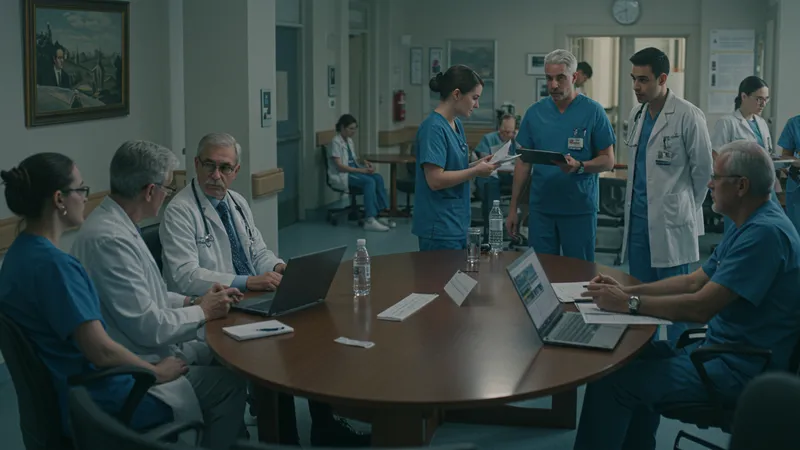
Many of these institutions are steeped in legacy systems where experienced professionals often view changes with skepticism. This narrative plays out when new tools suggest revisiting protocols that have been the gold standard for years. Yet, as younger generations of healthcare workers enter the workforce, there's an unavoidable push against the status quo, bridging a generation gap that demands attention. The interplay of tradition versus novel approaches forms a tension-filled backdrop against which future healthcare leaders are born.
What makes this more intriguing is the unexpected faction of allies gained by these courses. Patients who demand better, more efficient care become unwitting but potent advocates for change. Their experiences speak volumes in support of strategies that promise improved delivery and satisfaction. This indirect pressure from the patient community adds fuel to the evolving discourse within the healthcare establishment. But how exactly do these courses translate into better patient experiences?
The key is in the actionable, real-world strategies imparted by these courses, teaching practitioners to think not just clinically but strategically. Better management inevitably leads to better care environments, less staff turnover, and more holistic patient experiences. The result is a transformation that starts behind the scenes but becomes visible in hospital corridors and patient feedback reports. However, there's a showdown brewing as traditionalists find themselves increasingly cornered, and this is where the real battle begins. Are you ready to see how it all unfolds?
Beyond the immediate improvements in management skills, these courses are fostering a culture of long-term thinking that promises benefits far beyond what the eye can see. Graduates are not just returning to their roles with new insights—they're carrying back a vision for innovative healthcare systems that prioritize patient care without sacrificing efficiency. It's this blend of foresight and practical application that spells true transformation in healthcare settings.

Add to that the newfound ability to foresee challenges before they become unsolvable problems and you're looking at a cadre of leaders ready to tackle tomorrow's issues today. This forward-thinking mindset is what sets those who invest in healthcare management courses apart. Institutions that fail to recognize this innovation might find themselves left behind in an industry where adaptability is key. But there’s another element at play here that’s equally fascinating.
These courses tap into a deep well of untapped emotional intelligence, often overlooked in medical settings, bringing it to the forefront. Practitioners are not only trained to manage the logistics of healthcare but also to understand and influence the emotional landscape of their teams and patients. This human-centric approach is changing how healthcare environments function, creating spaces that are nurturing as well as efficient.
The journey doesn't end with improved professional competencies. Graduates of these programs often report personal growth as well, finding a balance between their professional demands and personal life that seemed elusive before. The holistic benefits reveal a world of opportunities that might have gone unnoticed without exploring this specific educational pathway. The transformative effect is just the beginning; wait till you see where this path leads next.
The improvement in management practices is not a mere administrative enhancement—it directly correlates with patient experiences. Improved scheduling systems, optimized resource allocation, and empowered staff lead to shorter wait times and smoother patient journeys. This domino effect culminates in the much-coveted positive patient feedback that hospitals strive for. The management courses, thus, indirectly but powerfully uplift not just operational aspects but patient satisfaction levels.
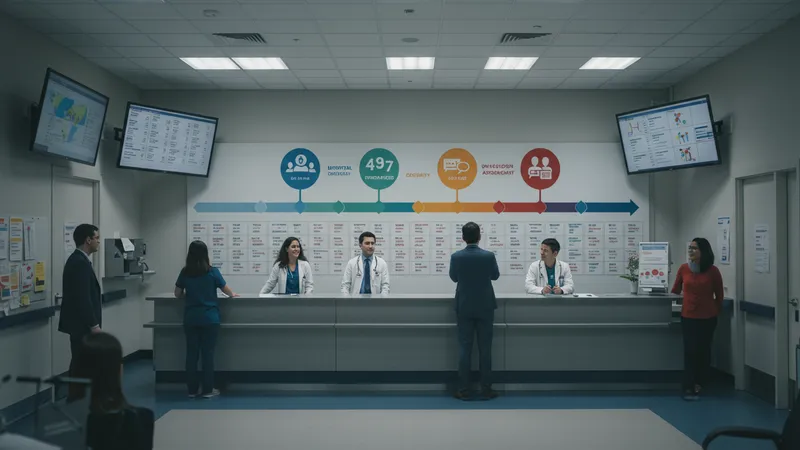
One startling reality is that patient experiences have gone from being a neglected statistic to a prime indicator of hospital success. This shift in perspective highlights the evolving importance of management practices in shaping healthcare systems. However, the deciding factor often lies in who helms the initiative—do they truly understand the patient impact of every managerial decision? That makes all the difference.
Staff inspired by innovative management training often relate an increased enthusiasm and commitment to their roles. They report a better ability to engage with patients, understand their needs, and offer personalized solutions. Delighted patients often translate into increased loyalty, better word-of-mouth, and ultimately, financial sustainability for healthcare institutions. It's a cycle worth investing in, but there’s a risk you should be aware of.
While the benefits are noteworthy, there are concerns about the availability of such courses across different regions, often limited by economic and operational barriers. This accessibility challenge threatens to create a disparity in healthcare quality among institutions. Addressing these obstacles is crucial for ensuring that patient experience improvements aren’t just confined to the privilege of a lucky few. What's next might just provide a solution to this pressing issue.
Navigating the maze of available courses can be overwhelming for healthcare professionals looking to enhance their management acumen. The key lies in understanding personal career goals and aligning them with course offerings. While some courses focus on strategic oversight, others delve into operational nuances—choosing rightly can define your professional path. Resources like Coursera offer detailed descriptions and reviews that can guide decisions effectively.

Experts recommend starting with a clear audit of one's current skills and identifying gaps that need addressing. Courses that offer hands-on experience alongside theoretical knowledge are highly recommended, as they provide practical insights that are directly transferable to real-world applications. This blend of knowledge ensures that students can visualize and implement strategies swiftly once courses are completed. But even the best courses demand something more from their participants.
Engagement is key; passive learning won’t bear the transformative results many seek. Actively participating in discussions, joining forums, and seeking mentor guidance can greatly enhance the learning experience. Doing so not only fosters a deeper understanding but also helps create invaluable professional networks important for career growth. But this isn’t the only consideration when choosing a course.
Affordability plays a crucial factor, with many institutions offering bundled packages and financial plans to ease the cost burden. Often, these financial arrangements create opportunities for learning that would otherwise be financially out of reach for many. By carefully assessing options, potential students ensure they invest in courses that offer maximum returns, not just educationally but in their professional careers. The future of healthcare management depends on informed and strategic decisions like these. What you’ll read next could change your approach entirely.
Across the globe, graduates of healthcare management courses are crafting success stories that underscore the power of proper education. In countries like India and Brazil, improved management practices have led to groundbreaking changes in hospital operations, even in resource-stretched environments. These stories aren’t just anecdotes—they’re testimonies to the transformative potential these courses offer.

One hospital in Kenya reported a 25% increase in patient throughput within the first year of its staff completing a specialized management training program. The operational efficiencies gained were compounded by a significant boost in staff morale and patient satisfaction. This story is just one example of numerous successes highlighting the global applicability and benefits of these education programs.
In the UK, an innovative approach by a group of management graduates reinvented public healthcare facilities, slashing waiting times by 40% and saving millions in operational costs. Their strategies have since been adopted across the nation, establishing new benchmarks for efficiency and patient care. These inspiring stories prove that well-designed management courses can lead to profound improvements, no matter the locality.
However, the spread of these stories brings us to a critical question: How can we ensure such success is evenly accessible worldwide? There’s a growing recognition that while the draw of management courses is undeniable, global access remains uneven. The next big challenge lies in finding viable solutions to this disparity. Stay with us to explore possible remedies that are already in motion.
The accessibility of healthcare management courses remains uneven, largely reflecting economic and digital divides. While some regions enjoy an abundance of resources, others struggle to access even basic training necessities. This disparity poses a significant challenge, where quality healthcare improvements could remain limited to specific areas, leaving others trailing behind in care standards.
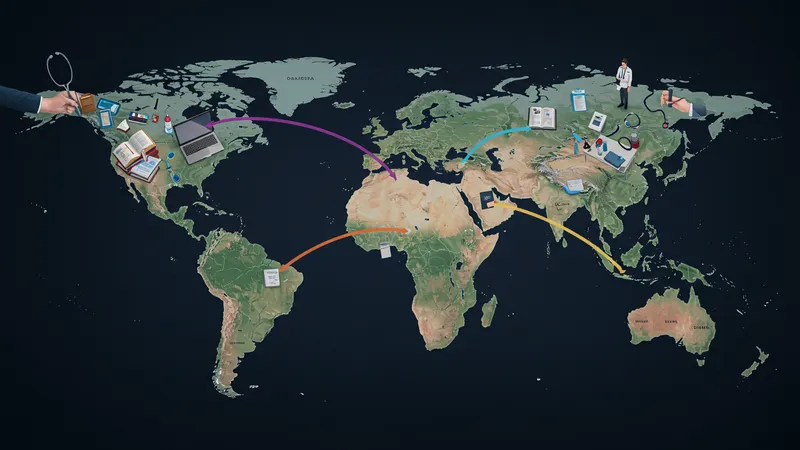
To tackle this, international organizations are stepping up, offering subsidized courses and leveraging technology to broaden reach. These initiatives aim to democratize healthcare education, ensuring practitioners from varied backgrounds have equal opportunities to advance their skills. However, the effectiveness of these efforts varies and often depends on local cooperation and resources.
Technical advancements, such as low-data streaming and compressed course materials, are changing the game, allowing students with limited internet access to participate in training sessions. Smartphone applications also offer mobile access to course content, bridging gaps in availability, particularly in remote locations. Still, there's more work to be done.
Deployment of these educational technologies presents its own set of challenges, with the need for critical infrastructure and policy support becoming urgent. The vision is to create a more equitable educational landscape, one where all healthcare professionals can nurture their management skills irrespective of their geographic and economic constraints. We are on the brink of significant transformations; explore the next section to see how these could unfold in unexpected ways.
As we look forward, the trajectory of healthcare management education is poised for some revolutionary transformations. The integration of AI and machine learning within course curricula stands to personalize learning paths as never before, tailoring courses to meet the individual's pace and understanding. This creates a more inclusive and adaptive educational experience, aligning perfectly with the diverse healthcare environment.

Moreover, blockchain technology could redefine certification and course validation, offering foolproof digital credentials that prevent fraud and ensure portability across borders. This innovation promises to change the way credentials are perceived and utilized on an international scale, providing a fair advantage to deserving candidates and institutions alike.
Virtual reality and augmented reality are also set to offer immersive, hands-on training that far exceeds traditional textbook learning. Imagine healthcare management scenarios brought to life with interactive training simulations, preparing participants for the most challenging real-world situations. These advancements mark the dawn of a new educational era, redefining possibility and scope in training excellence.
As these technologies converge, the impact on healthcare management is profound and inescapable. It becomes critical for both educators and students to stay abreast with these developments, ensuring they do not just participate but lead the next wave of healthcare evolution. These are undeniably exciting times for those open to embracing the potential of futuristic education. But what happens next is what truly captivates: a visionary shaping of healthcare’s future, paving the way for safer, more efficient patient care worldwide.
Cognitive biases are an often overlooked yet significant hurdle in healthcare management, influencing decision-making processes in ways not always apparent. Courses designed to recognize and negate these biases have become pivotal for modern healthcare leaders aiming to provide unbiased, efficient patient care. This often involves unlearning deeply ingrained perceptions which may subtly affect judgments.
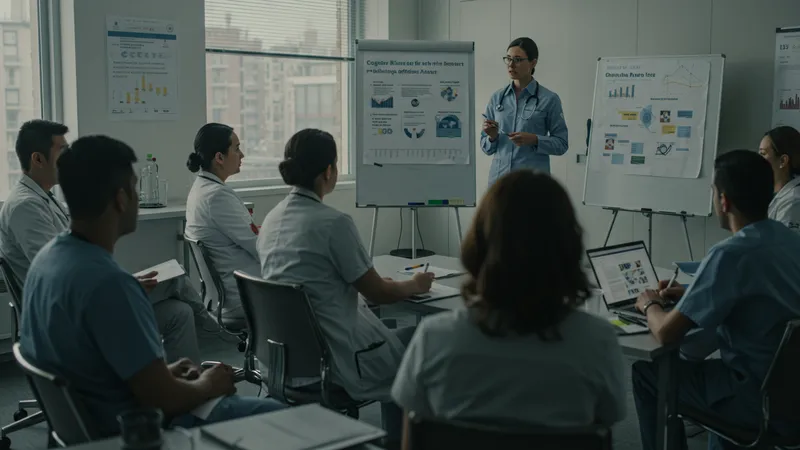
Studies have shown that bias can skew resource distribution, influence treatment plans, and even affect patient interaction, undermining the integrity of healthcare systems. Inclusive training programs are pivotal in addressing these issues by promoting awareness and fostering skills to manage such biases effectively. They do more than educate—they transform the way healthcare is delivered and perceived.
A fascinating realm where this is gaining traction is in data interpretation. Healthcare professionals, trained to look beyond superficial interpretations, utilize data more judiciously, leading to more precise diagnoses and treatment plans. This paradigm shift highlights the critical role of management education in not just tackling operational challenges but redefining patient care frameworks.
Those institutions which adopt this ethos not only witness increased internal coherence but also experience an external reputation boost as being forward-thinking and ethically grounded. It is a challenge but also an opportunity for lasting change in the healthcare landscape. The next steps will be critical in unleashing the full potential of this new approach. Could this finally be the answer to creating a fully equitable healthcare system worldwide?
Understanding the financial dynamics of healthcare management courses proves essential as costs often dictate accessibility and quality perceptions. Course fees range widely, influenced by factors such as institution pedigree, course length, and included resources. Discerning students must weigh these against the tangible value courses offer toward their career trajectories.

Interestingly, data suggest a marked correlation between course investments and subsequent career earnings, presenting courses as strategic financial ventures in career development. Financial aid options are increasingly prevalent, offering support across varying income levels. From scholarships to payment plans, the landscape is becoming more inclusive day by day.
The real financial boon lies in the return on investment these courses offer. Graduates equipped with honed management skills find themselves ascending organizational ladders faster, securing coveted positions and often commanding higher salaries. This financial equity transforms student perspectives, motivating enrollment despite initial hesitations.
Structured financing options have even fostered a competitive marketplace where course providers innovate to offer the best prospective value. Students are thus encouraged to thoroughly research and engage in courses that promise both educational merit and financial advantages. The ever-evolving ecosystem shows signs of positive shifts, but the journey to affordability for all continues. The next revelation might surprise you; is this the golden ticket many have been seeking?
Success in healthcare management education is now viewed through diverse lenses, encompassing personal growth, career advancement, and systemic impact. These courses go beyond imparting knowledge; they equip individuals to lead transformative changes within their organizations. Graduates are often champions of efficiency, ready to navigate complexities with refined strategic thinking.

The benchmark of success shifts from short-term achievements to long-term sustainability. Integrating learned strategies into daily practices ensures continuous improvement, not just as individual contributors but as mentors grooming the next generation of healthcare leaders. This cyclic progression enriches the industry at every level, ensuring that institutions remain updated and resilient.
Additionally, success stories from graduates create a ripple effect, inspiring others to embark on similar educational journeys. These legacies showcase a shared vision: an unparalleled healthcare system that champions excellence and integrity. As more narratives emerge, they collectively reshape the narrative of what is deemed successful in healthcare management.
The actionable lessons learned facilitate the role-model effect, encouraging peer learning beyond structured training environments. This broadens the impact spectrum of management education, presenting it not just as a key component of a medical career but as an overarching philosophy towards healthcare efficacy. But what if we’ve only just scratched the surface? Dive deeper into this exploration to uncover future implications that might redefine everything.
Prestigious institutions worldwide are embracing educational innovations, setting new standards of excellence in healthcare management training. These leaders aren't just innovating curriculum structures but are adopting a holistic view that merges technical learning with liberal arts, developing well-rounded professionals. Harvard and Johns Hopkins stand out with groundbreaking programs that challenge conventional educational paradigms.
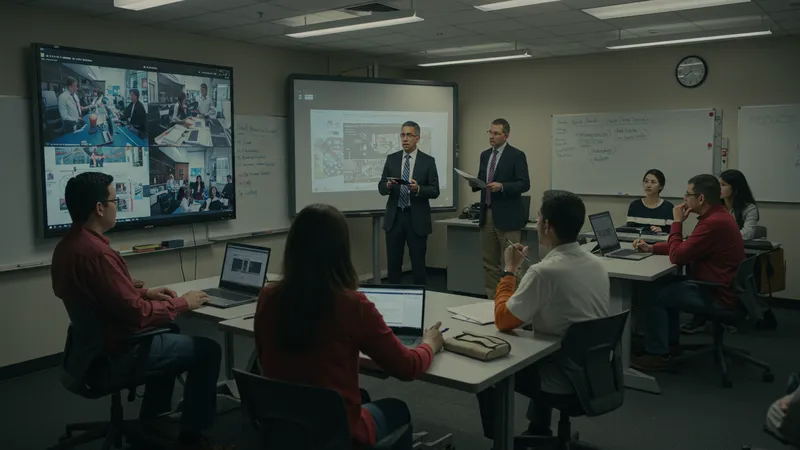
The strategic alliances between academia and health systems forge robust educational programs that reflect real-world complexities. By integrating industry insights, these courses offer enriched learning experiences that anticipate and address emerging trends in healthcare systems. Such partnerships lay the groundwork for pragmatic management solutions, ensuring professionals are dynamic and adaptive.
Moreover, these institutions aren't content merely to trailblaze on their own—they leverage their platforms to disseminate knowledge widely, hosting global conferences and sharing research that pushes the boundaries of current understanding. Empowerment through education becomes both a mandate and a mission, driving collective industry progress.
This proactive shift embodies a clear message: the future of healthcare lies in thought leadership that prioritizes strategic, informed, and inclusive decision-making. Emerging professionals are encouraged to join this vanguard, contributing to a global network of change agents committed to elevating healthcare standards. The evolution does not stop here—upcoming developments promise even more inclusive and progressive solutions. So what breakthrough lies just around the corner?
The world of healthcare management education is on the brink of breakthroughs we can scarcely imagine. As systems align and knowledge becomes more democratized, we stand at the cusp of a new dawn where excellence in healthcare is universal, not just a privilege. These courses are more than a pathway—they’re lifelines to a future where compassionate, effective management is the norm.
Are you ready to take part in this revolution? Share your insights, bookmark this page, and spread the message. Together, let’s champion a healthcare system that's better prepared and better managed for the challenges of tomorrow.